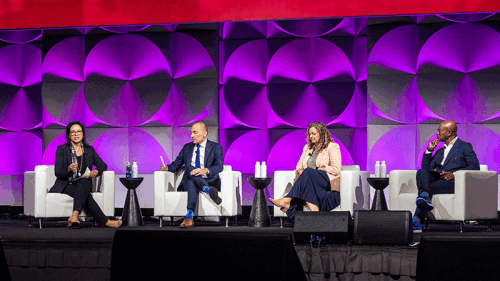Four CEOs of prominent U.S. and global real estate companies gathered at the 2008 ULI Fall Meeting in Miami for a candid conversation about how they expected their companies to be affected by the volatility in the financial markets and the underlying economy—and about how they planned to lead their companies into the future. Now, more than two years into the worst real estate market downturn in memory—with the future even less clear—Gadi Kaufmann, managing director and chief executive officer of RCLCO (Robert Charles Lesser & Co.) reconvened three of the original panel members and one new participant at this year’s Fall Meeting to discuss their experience and perspectives on the future. The ensuing discussion highlighted some differences among these leaders’ strategies and revealed no clear path into the future, but offers some valuable advice and lessons learned.
Panelists agreed that they’ve experienced a wild, scary ride over the past two years; only Jeremy Newsum managed to get step off the roller coaster, by stepping down as UK-based Grosvernor’s group chief executive in June 2008—although he remains an executive trustee of the Grosvenor Estate, as well as chairman of ULI—while Lawrence Corson recently leapt back on, taking over the role of president and chief executive officer of Charlotte, North Carolina–based Crescent Resources LLC in July 2010, just one month after it emerged from bankruptcy. Michael Fascitelli and Constance Moore, presidents and chief executive officers of New York–based Vornado Realty Trust and San Francisco–based BRE Properties, Inc., respectively, both commented on the depth, speed, and violence of the stock market collapse—and its impact on their firms. Despite stable earnings, both saw their REIT’s stock prices crash precipitously, recover somewhat, then crash again before beginning another gradual rise.
Looking into the future, panelists concurred that one of the biggest challenges they face involves making both long-term plans and day-to-day decisions in a time of continuing uncertainty, creating and implementing business plans and strategies that are flexible enough to be able “to adapt quickly to whatever realities do materialize in the market,” as Kaufmann put it. While all see some hopeful signs for their businesses on the horizon, they also admitted that they have learned some valuable lessons over the past few years, some of which are changing the ways they will do business forever. These include:
Communicate.To succeed as a chief executive officer in tumultuous times, you must “avoid drama” and “have confidence in your management team,” urged Moore. “You can’t overcommunicate at a time like this,” she added; effective leaders must “keep people informed and give them a sense that we’re going to make it through this.” “You have to be the company’s chief cheerleader,” Corson concurred, adding that one also must be forthright about pending job cuts: “People can handle the bad news; they can’t handle no news.” When staff cuts are needed, “be a surgeon,” urged Moore: “be honest, be quick, and get it done.” Fascitelli added that remaining staff members felt more secure—and better prepared to run a leaner company—after Vornado had completed two rounds of layoffs.
Recalibrate expectations.“Real estate is fundamentally the same as the market economy,” noted Newsum, adding that average returns in the future will be lower than those to which the industry had become accustomed. “People are resetting their calibrations to expect lower returns,” agreed Fascitelli; “they know in their belly that they need to do that.” Most panelists commented that they expect to grow their companies gradually—while also deleveraging them—during the coming period of slower economic growth. “It’s a longer-term business, and we need to get back to the basics,” added Newsum.
Focus on your core business.“For me, as a public REIT, it’s all about growing cash flow,” said Moore. Corson discussed the importance of a triage process—with both assets and people—in determining how to move forward with a development company that has a wide range of asset classes and skill sets. “We were ruthless about shutting down marginal projects,” commented Fascitelli, insisting that “those cuts made us a better company.”
Never forget.“While things are getting better, we’re already preparing for the next recession,” commented Moore. “What’s been amazing is how quickly some people have forgotten what’s happened,” she added. “I’m going to be the curmudgeon in the office; I’m not forgetting what it felt like. That’s going to make me a different CEO.”

